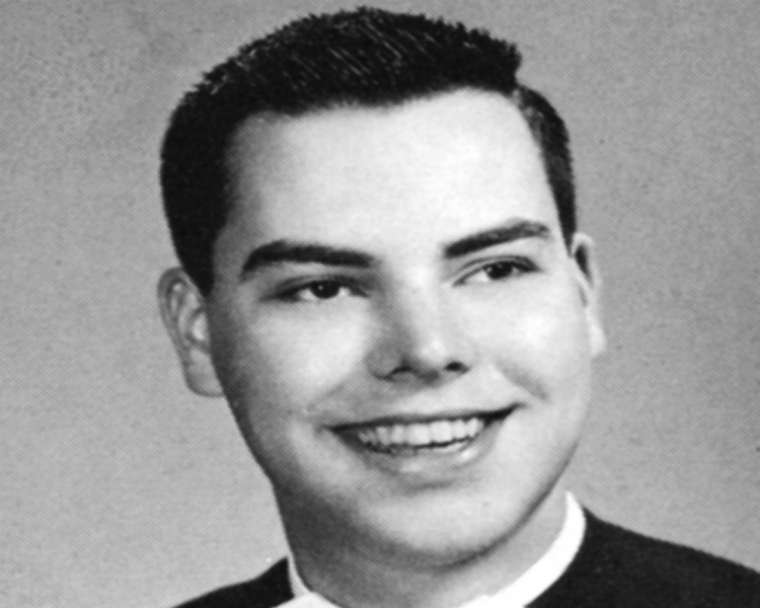Brother James Miller, Wisconsin Native and Guatemalan Martyr, to Be Beatified
The religious brother of the Christian Brothers was shot to death in February 1982. He was 37 years old.

VATICAN CITY — Pope Francis Thursday approved the beatification of American Brother James Miller, who was martyred in 1982 in Guatemala.
The declarations were made following a meeting Nov. 7 with Cardinal Angelo Becciu, prefect of the Congregation for the Causes of Saints. Pope Francis gave his approval for Miller’s beatification, declaring he was killed “in hatred of the faith,” and advancing 23 other causes for canonization.
The Pope also confirmed the heroic virtue of Servant of God Michael Giedrojć and declared his beatification.
Now-Blessed Michael Giedrojć was a brother of the Order of St. Augustine who was born in Lithuania around the year 1420. He died in Krakow, Poland, on May 4, 1485.
Giedrojć was approved through an “equivalent beatification,” a process by which the pope may declare a person to be a “Blessed” without the typical investigation and miracle, due to a long-standing recognition of the person’s holiness and virtue, usually in the place where he or she lived, called a “local cult.” The same process may be used for a canonization.
Brother James Alfred Miller, who was a religious brother of the Institute of the Brothers of Christian Schools (called Christian Brothers) was serving in Guatemala when he was shot to death by three hooded men on the afternoon of Feb. 13, 1982, dying instantly. He was 37 years old.
Brother James, who was born near Stevens Point, Wisconsin, in 1944, took the habit of the Christian Brothers in August 1962.
He coached football and taught Spanish, English and religion in a high school in St. Paul, Minnesota. There his construction and maintenance abilities gained him the nickname “Brother Fix-It.”
Brother James was later sent to teach in Nicaragua, where under his leadership a school grew from 300 to 800 students and he supervised the construction of 10 new rural schools.
In July 1978 his superiors asked him to leave the country because of the danger amid the Sandinista Revolution. He returned to the U.S. and again taught high school.
He was sent to mission territory in Guatemala in 1981, teaching at a secondary school and at a center for studies for young indigenous Mayans from rural areas.
He was assassinated the following February while standing on a ladder repairing a wall of a school building.
Local authorities did not identify the gunmen.
His killing was one in a string of assassinations of priests and religious in the country, including that of Blessed Stanley Rother on July 28, 1981.
Aware of the danger present to him in Guatemala, in one of his last letters before he died, Brother James wrote: “I am personally weary of violence, but I continue to feel a strong commitment to the suffering poor of Central America. … The Church is being persecuted because of its option for the poor.”
“Aware of numerous dangers and difficulties, we continue working with faith and hope and trusting in God’s providence. … I pray to God for the grace and strength to serve him faithfully among the poor and oppressed in Guatemala. I place my life in his providence. I place my trust in him.”
The date of his beatification has not been announced but is expected to take place sometime in 2019.
In addition, Pope Francis Nov. 8 declared the martyrdom of Angelo Cuartas Cristobal and eight companions, alumni of the Seminary of Oviedo, Spain, who were killed in Oviedo between 1934-1937; and Mariano Mullerat i Soldevila, a layman and father, who was killed near Arbeca, Spain in 1936.
The Pope also recognized miracles attributed to Venerable Edvige Carboni (1880-1952) and Benedetta Bianchi Porro (1936-1964), paving the way for their beatifications.
The heroic virtue of nine other Catholics was also declared, advancing their causes along the path of beatification.
They are: Italian Bishop Giovanni Jacono (1873-1957); Filipino Bishop Alfredo Maria Obviar, founder of the Congregation of the Missionary Catechists of St. Teresa of the Child Jesus (1889-1978); Italian Father Giovanni Ciresola, founder of the Congregation of the Poor Servants of the Most Precious Blood-Cenacle of Charity (1902-1987); Italian Father Luigi Bosio (1909-1994); Italian Father Luigi Maria Raineri, member of the Congregation of the Clerics Regular of St. Paul (1895-1918); Spanish Sister Maria Antonia di Gesu, member of the Discalced Carmelites (1700-1760); Spanish Sister Arcangela Badosa Cuatrecasas, member of the Congregation of the Sisters of the Blessed Virgin Mary of Mount Carmel (1878-1918); Italian Sister Maria Addolorata del Sacro Costato of the Congregation of the Sisters of the Passion of Jesus Christ (1920-1954); and Italian Lodovico Coccapani, lay member of the Secular Franciscan Order (1849-1931).
This story was updated after posting to include the correct death date of Father Stanley Rother.
- Keywords:
- beatifications
- canonization causes
- martyrs
















